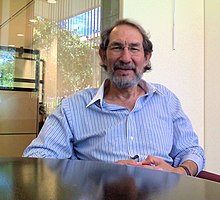Geoffrey West
Appearance

Geoffrey Brian West (born 15 December 1940) is a British theoretical physicist, former president and distinguished professor of the Santa Fe Institute
Quotes
[edit]1990s
[edit]- Everything around us is scale dependent. It's woven into the fabric of the universe.
- From: George Johnson. "Of Mice and Elephants: A Matter of Scale," in: hep.ucsb.edu. Jan. 12, 1999.
2000s
[edit]- Humanity has just crossed a major landmark in its history with the majority of people now living in cities. Cities have long been known to be society's predominant engine of innovation and wealth creation, yet they are also its main source of crime, pollution, and disease. The inexorable trend toward urbanization worldwide presents an urgent challenge for developing a predictive, quantitative theory of urban organization and sustainable development
- Bettencourt, L. M., Lobo, J., Helbing, D., Kühnert, C., & West, G. B. (2007). "Growth, innovation, scaling, and the pace of life in cities." Proceedings of the national academy of sciences, 104(17), 7301–7306.
2010s
[edit]- I’ve always wanted to find the rules that govern everything. It’s amazing that such rules exist. It’s even more amazing that we can find them.
- From: Jonah Lehredec. "A Physicist Solves the City," in www.nytimes.com. Dec 17, 2010.
- Once we started to urbanize, we put ourselves on this treadmill. We traded away stability for growth. And growth requires change.
- From: Jonah Lehredec. "A Physicist Solves the City," in www.nytimes.com. Dec 17, 2010.
- A human being at rest runs on 90 watts. That’s how much power you need just to lie down. And if you’re a hunter-gatherer and you live in the Amazon, you’ll need about 250 watts. That’s how much energy it takes to run about and find food. So how much energy does our lifestyle [in America] require? Well, when you add up all our calories and then you add up the energy needed to run the computer and the air-conditioner, you get an incredibly large number, somewhere around 11,000 watts. Now you can ask yourself: What kind of animal requires 11,000 watts to live? And what you find is that we have created a lifestyle where we need more watts than a blue whale. We require more energy than the biggest animal that has ever existed. That is why our lifestyle is unsustainable. We can’t have seven billion blue whales on this planet. It’s not even clear that we can afford to have 300 million blue whales.
- From: Jonah Lehredec. "A Physicist Solves the City," in www.nytimes.com. Dec 17, 2010.
- The paradigm of physics - with its interplay of data, theory and prediction - is the most powerful in science.
- From: Joao Medeiros. "The city in numbers: An equation that explains urban life," in wired.co.uk/magazine 29 March 2011.
- The good news is cities are extraordinarily resilient. The bad news is that they are also very hard to change.
- From: Joao Medeiros. "The city in numbers: An equation that explains urban life," in wired.co.uk/magazine 29 March 2011.
- You could not have evolved a complex system like a city or an organism - with an enormous number of components - without the emergence of laws that constrain their behavior in order for them to be resilient.
- From: Ben Lillie. "The sameness of organisms, cities, and corporations: Q&A with Geoffrey West." at blog.ted.com. July 26, 2011.
- Cities are the crucible of civilization.
- From: Austin Brown. "Geoffrey B. West, 'Why Cities Keep on Growing, Corporations Always Die, and Life Gets Faster'." at blog.longnow.org, July 26th, 2011.
- It’s hard to kill a city, but easy to kill a company.
- From: Austin Brown. "Geoffrey B. West, 'Why Cities Keep on Growing, Corporations Always Die, and Life Gets Faster'." at blog.longnow.org, July 26th, 2011.
- Every fundamental law has exceptions. But you still need the law or else all you have is observations that don’t make sense. And that’s not science. That’s just taking notes.
- From: Robert Krulwich. "Nature Has A Formula That Tells Us When It's Time To Die," at npr.org, Jan. 22, 2013.
- Economics hasn't had an Einstein because it hasn't had a Galileo yet.
- From: Ole Peters, at Santa Fe Institute's New Complexity Economics Symposium, Nov. 8-9, 2019.

